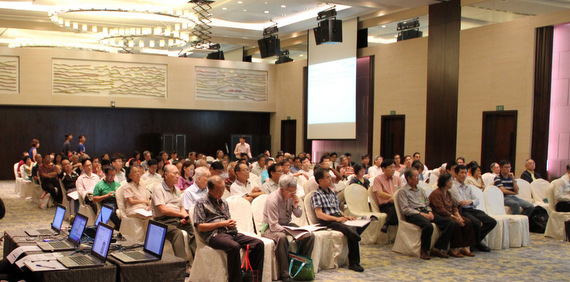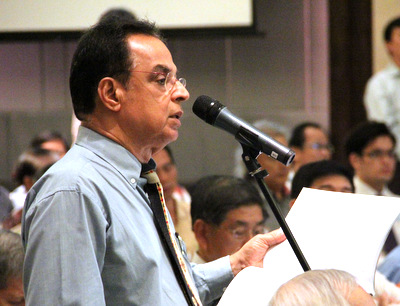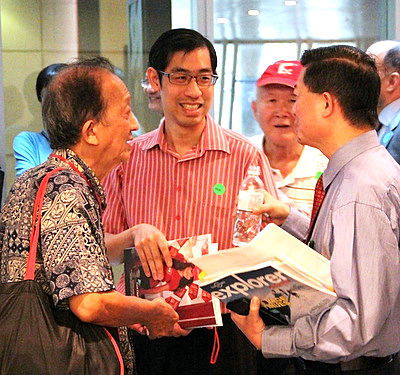 Food Empire executive chairman Tan Wang Cheow is flanked by CEO Sudeep Nair (right) and CFO William Fong.
Food Empire executive chairman Tan Wang Cheow is flanked by CEO Sudeep Nair (right) and CFO William Fong.
 Time & date: 3 pm, 22 April 2016.
Time & date: 3 pm, 22 April 2016.
Venue: Carlton Hotel
Photos by Ong Chin Keet
FOOD EMPIRE is launching new products -- its own coffee-making machines for home and office use with its own coffee capsules to go with them.
Tapping on that core skills set, Food Empire is also producing capsules that can be used in the popular Nespresso coffee maker.
Executive chairman Tan Wang Cheow's message in the FY2015 annual report mentioned all that in several sentences. And there is a full page (page 9) of pictures of the products.
Three shareholders at the AGM wanted to know more, so CEO Sudeep Nair shed more light on it.
He said that getting one's cup of freshly-brewed coffee from capsules has been a growing trend in the last decade in Europe and North America, popularised by Nestle (the brand behind Nespresso).
| "Nespresso… has lost several court battles aimed at preventing cheaper, third-party pods from finding their way into its machines.” Wall Street Journal (11 March 2014) |
Still in its infancy in Asia but growing rapidly, this way of getting one's coffee at home and in the office appeals to the higher-end of the market where Food Empire does not have a big presence.
It's pricey but it can only get more affordable with the expiry of the patent that Nespresso held.
Wall Street Journal reported that "Nespresso lost a key patent in 2013, leaving its machines now compatible with more than 200 pods made by competitors."
Food Empire is about to join that band of competitors.
In 2015, it entered into a joint venture with an Italian company to manufacture Nespresso-compatible capsules for owners of Nespresso machines.
Of course, the compatibles (sold under a new Food Empire brand) will sell at a discount to Nespresso's capsules.
What's interesting is that the Food Empire JV, Cap Empire, has also designed its own patented coffee-making machines called Coffee One.
And the machines are designed for use with coffee capsules developed by the Food Empire JV.
"This is a closed-end system. If we find clients who want to launch their own systems and their own capsules under their own brands, we could offer them the entire system," said Mr Nair.
| ♦ Caffe Bene |
 Photo: www.yelp.comThere was some discussion on the other key new business of Food Empire. A JV forged by Food Empire and Salim Group of Indonesia has recently acquired a 38.44% stake in Caffe Bene, the No.1 coffee chain in South Korea (ahead of Starbucks). Photo: www.yelp.comThere was some discussion on the other key new business of Food Empire. A JV forged by Food Empire and Salim Group of Indonesia has recently acquired a 38.44% stake in Caffe Bene, the No.1 coffee chain in South Korea (ahead of Starbucks).Caffe Bene offers business diversification for Food Empire (which has primarily produced 3-in-1 coffee in sachets for the mass market) as well as downstream opportunities. (See: FOOD EMPIRE: Lots of new potential open up for Caffe Bene, Korea's No.1 coffee chain). The JV, Hallyu Ventures, now the No.2 shareholder of Caffe Bene, has an option to become No.1 by increasing its stake to 51% of the enlarged share capital by end-Dec 2016. A Food Empire shareholder voiced his concern that, while the JV may have legal control and financial control of Caffe Bene, it could face issues from not having operational control. The shareholder added that such a challenge surfaced in a dispute a few years ago between a listed F&B company (the controlling shareholder) and the founders of a popular restaurant chain who were the minority shareholders. Replying, Food Empire executive chairman Mr Tan said Caffe Bene's operations are in the hands of professionals who are non-shareholders. The other major shareholder of Caffe Bene is a private equity fund, K3 Private Equity Fund No. 5, with whom Food Empire has a positive relationship. And given the nature of private equity firms, K3 can be expected to liquidate its investment in Caffe Bene after a period of time. |
 Shareholder Mano Sabnani asked about the performance of Food Empire in various key markets. At the AGM, there were also questions on hedging against foreign currency fluctuations.
Shareholder Mano Sabnani asked about the performance of Food Empire in various key markets. At the AGM, there were also questions on hedging against foreign currency fluctuations.
Food Empire's key currency exposure is to the Russian ruble and the currencies of Ukraine and Kazakhstan -- all of which are affected by the volatility of the price of oil.
Food Empire hedges only part of its ruble exposure, primarily in order to pay for raw materials in USD, said Mr Nair. Shareholders speaking with Executive Chairman Tan Wang Cheow after the AGM.It's too costly to hedge fully, which is also why Food Empire does not hedge against the other foreign currencies of its key markets.
Shareholders speaking with Executive Chairman Tan Wang Cheow after the AGM.It's too costly to hedge fully, which is also why Food Empire does not hedge against the other foreign currencies of its key markets.
Hedging can be disadvantageous as it restrains one's recovery when currencies (or oil prices) normalise, said Mr Nair.
He noted that some airlines that previously hedged against high oil prices did not enjoy the benefits of falling oil prices for a long while until the hedging periods expired.






